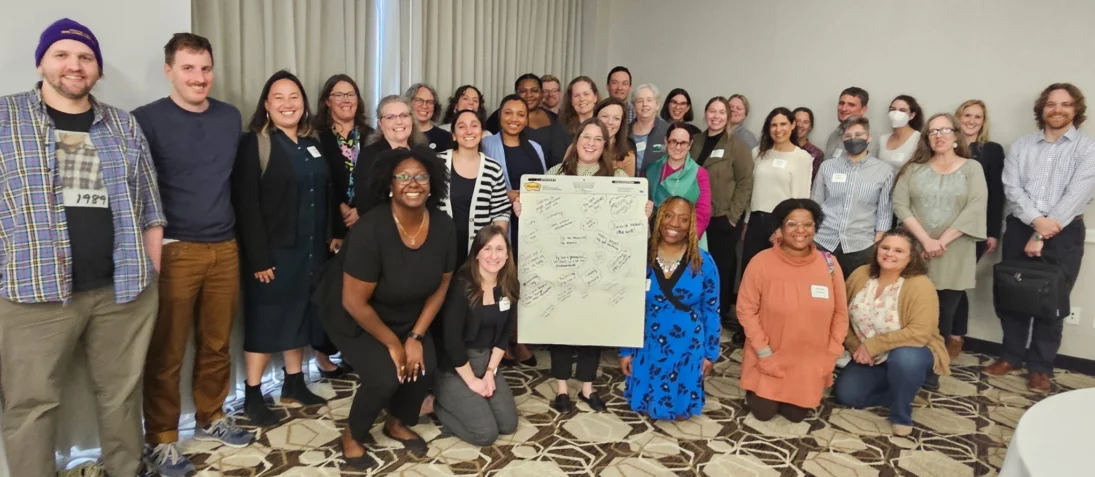
Legal Impact Network and Vermont Legal Aid hosted a convening in Concord, New Hampshire, drawing area attorneys, advocates, and residents
May 29, 2025
When it comes to issues like affordable housing, notoriously expensive cities like New York tend to dominate the discussion, even though rent has skyrocketed nearly everywhere. Staff at Vermont Legal Aid (VLA) wanted to shift the national conversation to their own backyard. New England, with its mix of rural and urban areas, is a unique landscape for housing advocates.
VLA had the idea to host a regional conference, so they contacted the Legal Impact Network (LIN) — a group of 38 state-based advocacy organizations coordinated by the Shriver Center on Poverty Law. LIN and Vermont Legal Aid, a LIN member, collaborated to create “Justice in Housing New England.”
On April 25, nearly 50 people gathered in Concord, New Hampshire for a unique opportunity to discuss regional challenges and victories. Participants included not just advocates and attorneys but also New England residents, some of whom have experienced housing instability.
“It was a really affirming experience, particularly at a time when the national landscape for housing protections is so bleak,” said Sarah Carthen Watson, the movement lawyer for the LIN.
“Smaller regions tend to get drowned out of the national conversation about housing, whether it’s about rising rents, discrimination, or evictions.”
The day kicked off with a recorded message from Vermont Congresswoman Becca Balint, an outspoken voice for housing justice. Currently, she is working on a bill to stop landlords from using digital price fixing to artificially drive up rents.
“We are in the richest country in the world. Everyone should have housing. Period. It’s a human right,” she said.
Following Balint’s message, representatives from across Connecticut, Maine, Massachusetts, New Hampshire, and Vermont presented on how local demographics, politics, and legal frameworks affect everything from fair housing to affordability. In Boston, for example, gentrification has been uprooting communities of color for decades. For Vermont, which ranks 4th in its rate of homelessness nationwide, a major problem is inadequate emergency housing support like rental assistance and access to shelters.
Carolyn Chou, executive director of Homes for All Massachusetts, delivered the keynote address. Her organization provides state-level policy support for tenant groups throughout Massachusetts. Chou’s message underscored a core tenet of the LIN: bridging the gap between lawyers and organizers. Sharing examples from a decade of community organizing experience, she said that to win systemic change, attorneys need to embrace collective action.
The second part of the day was devoted to panel discussions and case studies. In a panel aptly titled “How to do Housing Work When Everything Sucks,” presenters shared resources on how to navigate the current housing landscape. A representative from the Vermont Human Rights Commission underscored the importance of testing for housing discrimination in the investigation and litigation of fair housing issues. The panel also examined new ways to protect vulnerable clients, now that cases involving discrimination based on gender identity will no longer be accepted by the U.S. Department of Housing and Urban Development (HUD).
During a lively Q&A, an advocate shared her story of housing discrimination in Boston. To find an apartment, the woman felt the need to work with a white real estate agent because many landlords refuse to rent directly to a person of color. One such landlord was eventually reported and discovered to have a record of discrimination. Presenters then highlighted the importance of fair housing testing and potential enforcement options. The example also exposed a central problem: proving a pattern of discrimination is often painstakingly slow, while the need for housing is immediate. Her experience was also a powerful reminder that housing justice advocacy is not just a calling; for many, it’s deeply rooted in personal experience.
The day ended with attendees sharing what drives them to do this work and reaffirming their commitment to housing justice despite it being harder than ever. To continue their collaboration, members of the Legal Impact Network formed the “New England Region Working Group.”
Strengthening regional connections is part of the LIN and Shriver Center’s larger goal to build durable strategies that protect the rights of marginalized communities. LIN Director Ramina Davidson believes replicating the success of the New England event is a key part of that work.
“LIN is committed to bringing people to the table that don’t get enough visibility,” Davidson said. “We would love to partner with advocates in other regions on similar convenings. For example, I see an opportunity to discuss environmental justice in the Gulf South.”

All people should have the right to a safe, stable home to build better futures for themselves and their families.
Shelter is not only a basic human need, it is also critical to people’s ability to pursue and attain economic stability.